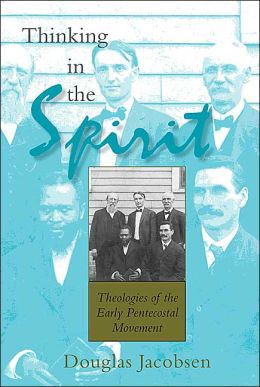Douglas Jacobsen: Thinking in the Spirit, reviewed by Amos Yong
 Douglas Jacobsen, Thinking in the Spirit: Theologies of the Early Pentecostal Movement (Bloomington and Indianapolis: Indiana University Press, 2003), xvi + 418 pages, ISBN 9780253343208.
Douglas Jacobsen, Thinking in the Spirit: Theologies of the Early Pentecostal Movement (Bloomington and Indianapolis: Indiana University Press, 2003), xvi + 418 pages, ISBN 9780253343208.
This is a book long overdue, and places us all in debt to Douglas Jacobsen, Distinguished Professor of Church History and Theology at Messiah College in Grantham, Pennsylvania. While a large volume, it is nevertheless very focused and precise. On the one hand, Jacobsen limits his survey of early pentecostal theologies to those articulated during the first twenty-five years or so of the movement. On the other hand, Jacobsen is the consummate narrator and historian of theology in these pages, describing early pentecostal theologies with immaculate detail and allowing the theologians he is presenting to speak with their own voices, all the while keeping his own theological perspective effectively muted. He hopes in the concluding chapter that “this book will help contemporary pentecostal theologians and church leaders engage each other in constructive ways, reminding them that a vigorous diversity of opinion has been part of the pentecostal heritage from the very beginning of the movement” (p. 355). This work accomplishes the author’s objectives admirably, in this reviewer’s opinion. Let me mention three reasons why.
First, as Jacobsen notes, is the very important reminder regarding the diversity of pentecostal theologies even among the earliest thinkers of the movement. The six chapters present twelve theologians: the “original visions” of Charles Fox Parham and Richard Spurling (later influential in the Church of God, Cleveland, Tennessee); the Azusa Street era theologies of William J. Seymour, George Floyd Taylor (later of the Pentecostal Holiness Church), and David Wesley Myland (a convert to pentecostalism from the Christian Missionary Alliance); the Finished-Work theology of William H. Durham and the Holiness Pentecostal theology of Joseph Hillery King; the Oneness theologies of Garfield T. Haywood and Andrew David Urshan; the Afrocentric and anti-racist theology of Robert Clarence Lawson; and the “boundary” theologies of independent evangelist Fred Francis Bosworth and mystical thinker Esek William Kenyon. The plurality of early pentecostal theologies should be evident simply given this listing. Jacobsen’s gift to contemporary pentecostal theologians and church leaders is to provide a coherent narrative demonstrating the interconnectedness of these various ideas and systems of thought without compromising their distinctive contributions and perspectives. Here, as in the day of Pentecost, we have a plurality of voices giving testimony to the wondrous workings of the Spirit of God.
“Here, as in the day of Pentecost, we have a plurality of voices giving testimony to the wondrous workings of the Spirit of God.”
Category: Church History, Summer 2004


